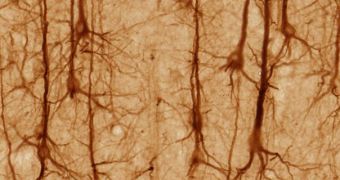Scientists now believe they may have discovered a type of neuron that is responsible for filtering our irrelevant data and information we are subjected to daily. These nerve cells inhibit neural pathways that would otherwise process that information further.
The new investigation was conducted at the McGill University, in Canada. Researcher Julio Martinez-Trujillo, MD, PhD, led the team that made the discovery. He explains that malfunctions in these neurons may be involved in a host of neural disorders.
Basically, these nerve cells could play a role in a major slew of conditions that make sufferers unable to understand or grasp basic concepts, while at the same time disregarding the information that is put there to cover space, and that has no direct relevance to the issues being discussed or presented.
The prefrontal cortex of the brain is the area that is most severely affected by malfunctions occurring in these neurons, the group reports in a paper scheduled to be published in an upcoming issue of the esteemed medical journal Neuron.
Experts say that the primary side-effects of function breakdown in these neurons include loss of inhibitions, impulsivity, as well as inappropriate behavior. As such, addressing the root cause could lead to new forms of treatment for these effect, PsychCentral reports.
An inability to focus on relevant and important aspects of a conversation or presentation have also been found to exist in patients suffering from conditions such as schizophrenia, obsessive-compulsive disorder, Tourette syndroms and attention deficit hyperactivity disorder.
As such, experts have been looking for the neurons responsible for the brain's filtering function for many years. Now, Martinez-Trujillo's team appears to have identified the nerve cells in question.
“Contrary to common beliefs, the brain has a limited processing capacity. It can only effectively process about one per cent of the visual information that it takes in,” the expert explains.
“This means that the neurons responsible for perceiving objects and programming actions must constantly compete with one another to access the important information,” he goes on to say.
“What we found when we looked at the behavior of the neurons in the prefrontal cortex, was that an animal’s ability to successfully accomplish a single action in the presence of visual clutter, was dictated by how well these units suppressed distracting information,” Martinez-Trujillo explains.
Developing drugs that target these neurons specifically could enable healthcare experts to boost or inhibit their function at will, depending on the mental disorder being treated.

 14 DAY TRIAL //
14 DAY TRIAL //